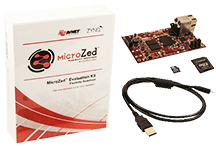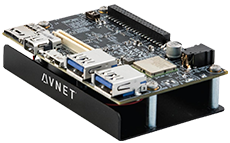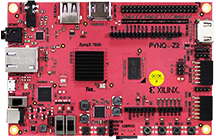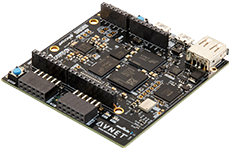Programmable Devices II: Programmable SoCs
The element14 ESSENTIALS of Programmable Devices II covers an introduction to programmable SoCs, their architecture and development, their surrounding developed ecosystems, and how to overcome common barriers. This supplementary guide discusses some development boards available for projects and prototyping.
SoC Development Boards
The Avnet MicroZed is a development board based on the Xilinx Zynq
-7000 All Programmable SoC. It can be used as both a stand-alone evaluation board for basic SoC experimentation or combined with a carrier card as an embeddable system-on-module (SOM). MicroZed contains 2 I/O headers that provide connection to 2 I/O banks on programmable logic (PL) side of the Zynq
-7000 AP SoC device. In stand-alone mode, these 100 PL I/O are inactive. When plugged into a carrier card, the I/O are accessible in a manner defined by the carrier card design. This combined stand-alone/SOM approach can move a design idea from concept to production, making MicroZed the ideal platform for SoC based applications.
The Ultra96 is an Arm-based, Xilinx Zynq UltraScale+
MPSoC development board based on the Linaro 96Boards specification. The 96Boards' specifications are open and define a standard board layout for development platforms that can be used by software applications, hardware devices, kernels, and other system software developers. Ultra96 represents a unique position in the 96Boards community with a wide range of potential peripherals and acceleration engines in the programmable logic that is not available from other offerings.
The ZedBoard is a development board for the Xilinx Zynq
-7000 All Programmable SoC. This board contains everything necessary to create a Linux, Android, Windows
or other OS/RTOS-based design. Additionally, several expansion connectors expose the processing system and programmable logic I/Os for easy user access. It takes advantage of the Zynq-7000 AP SoC's tightly coupled ARM
processing system and 7 series programmable logic
.
|
|
|
The TUL PYNQ-Z2 board, based on the Xilinx Zynq SoC is designed for the Xilinx University Program to support PYNQ (Python Productivity for Zynq) framework and embedded systems development. PYNQ is an open-source project from Xilinx
that makes it easy to design embedded systems with Xilinx Zynq
Systems on Chips (SoCs). Using the Python language and libraries, designers can exploit the benefits of programmable logic and microprocessors in Zynq to build more capable and exciting embedded systems. The ZYNQ XC7Z020-1CLG400C features include:
The MiniZed single core Zynq 7Z007S development board is ideal for entry level Zynq developers. This compact design features on-board connectivity through USB, Wi-Fi, and Bluetooth. Peripherals can be plugged into dual Pmod compatible connectors, the Arduino compatible shield interface/USB 2.0 host interface. JTAG circuitry is incorporated onto the MiniZed
base board, so with a single microUSB cable to your laptop you are already up and running. MiniZed
provides for an efficient hardware reference design, while it is also an inexpensive board that can be used to run workshops and tutorials. It aims to showcase the power of Zynq, where the Cortex-A9
processor core integrates seamlessly with programmable fabric to provide signal processing and control solutions. The on-board digital microphone serves as an input for a variety of illustrations of how to implement FIR filters, FFTs and direct memory access.
|
|
|
*Trademark. Xilinx is a trademark of Xilinx Inc. Other logos, product and/or company names may be trademarks of their respective owners.








